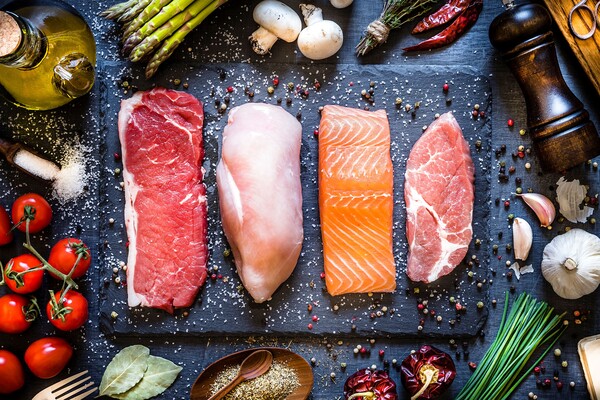After a cancer diagnosis, patients are often preoccupied with concerns about diet. This is largely due to many myths suggesting that daily foods and drinks are linked to cancer.
What criteria should cancer patients use to choose their food, then?
"The key is a balanced diet," said Lee You-jin, a clinical nutritionist at the National Cancer Center (NCC), on the hospital’s YouTube channel. "Instead of blindly avoiding foods, cancer patients should make informed choices based on scientific evidence."
With these principles in mind, what about staple foods like milk, meat, wheat flour, coffee, sugar, and oil after a cancer diagnosis?

According to Lee, milk is fine in moderation -- about one to two glasses a day. Lee explained, “Milk can be consumed in moderation. The claim that hormones in milk ‘cause cancer’ refers to the IGF-1 (Insulin-like Growth Factor-1) component. However, the amount in milk is minimal, and most of it is broken down during digestion.”
Park So-dam, another clinical nutritionist at NCC, explained that milk helps maintain the health of cancer patients. Park said, “Milk is rich in calcium, vitamin D, and protein, which can help maintain bone health and stamina during cancer treatment. While calorie and saturated fat intake might be a concern, choosing low-fat or fat-free dairy products is a good solution.”
On the subject of meat, Lee stated, “Processed meats should definitely be reduced. However, there's no need to eliminate meat entirely.” Park added, “Focus on lean cuts. Red meat is an important source of nutrients like protein and iron,” and noted, “The World Cancer Research Fund guidelines also recommend consuming within 350-500g per week.”
Turning to wheat flour, there's also a common belief that it causes cancer. Is this true?
Lee stated, “Wheat flour itself isn't the problem. Rather, the issue is consuming excessive amounts of refined carbohydrates (like bread, cookies, cakes, etc.).” Park added, “When choosing foods containing wheat flour, it's important to select less sweet and less greasy varieties.”
Lee also addressed concerns about coffee: “Cancer patients often worry about coffee, but the International Agency for Research on Cancer (IARC) removed coffee from its list of carcinogens back in 2016. In conclusion, moderate coffee consumption is not a problem. It may even have benefits.”
Referring to coffee, Park noted, “Recent studies also report that coffee lowers the risk of liver cancer, endometrial cancer, and prostate cancer.” However, she cautioned, “If you have gastrointestinal issues, it's better to choose decaffeinated coffee or avoid drinking it on an empty stomach.” Therefore, drinking up to three to four cups of coffee a day is fine if it doesn't strain the stomach.
Lee addressed concerns about nuts: “Numerous studies show nut consumption lowers overall cancer mortality and the incidence of specific cancers,” adding, “However, since nuts are high in calories, it's important to consume them in appropriate amounts.”
Park advised, “Be careful with moldy nuts. Aflatoxins, which can develop in improperly stored nuts, are linked to liver cancer. Therefore, proper storage of nuts is essential.”
Given the discussion about nuts, does this mean that not only the oil in nuts but also various vegetable oils are harmful to cancer patients?
Lee replied, “Consuming an appropriate amount of oil when cooking, such as for frying or sautéing, is not a problem at all.” Park also suggested, “If you cook without using any oil, the food will inevitably taste bland. It's good to enjoy eating while using an appropriate amount, not excessively.”
Turning to less healthy foods, greasy items like chicken and pizza are not recommended due to their high saturated fat content. Still, consuming them in “moderate amounts” about once or twice a month is generally fine. Cancer patients are also sensitive to sugar, but does that mean adding sugar during cooking is off-limits? No.
Lee stated, "Using sugar in normal amounts for sauces or seasoning poses no problem."
Next, what about desserts that are high in sugar?
Lee noted, "Occasional desserts, like once a week or on special occasions, are fine. When cancer patients can eat little, frequent small portions of tolerated foods help with calorie intake. Ultimately, there’s no absolute ‘forbidden food.’"

